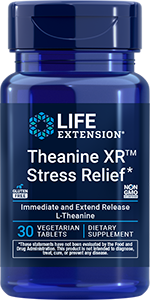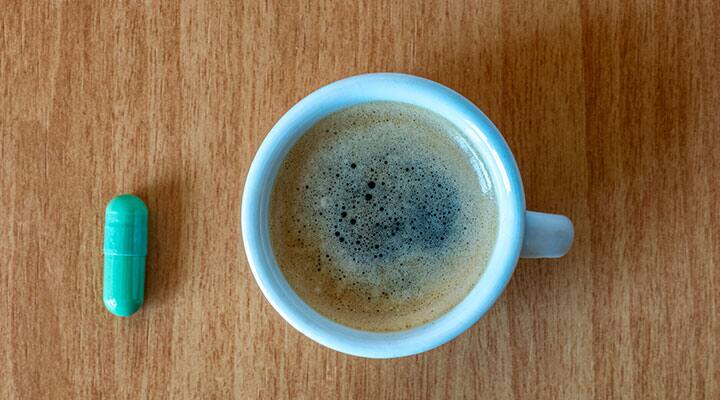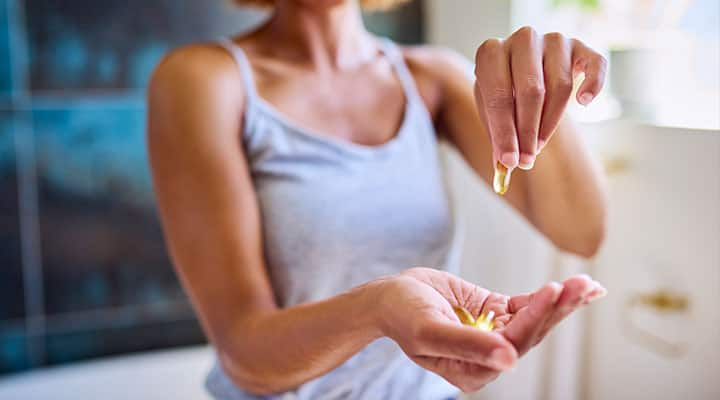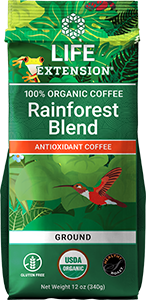
L-Theanine and Caffeine: Should You Take Them Together?
Published: April 2025
There's a reason cultures worldwide have perfected tea rituals over centuries, allowing people to slow down and engage with the world more mindfully.
The active compounds in tea responsible for this relaxed yet wakeful state of mind are L-theanine and caffeine. L-theanine is an amino acid that gives several types of tea (most famously, green tea, but also oolong, black tea, white tea, and others) that savory-sweet, umami depth. It promotes a state of wakeful rest comparable to meditating but without sleepiness. And, some teas are a source of caffeine, which helps you stay alert and focused.
Why not just drink coffee? While it offers its own set of rich health benefits, this popular stimulant doesn't deliver the smooth, sustained and gentle energy green tea provides thanks to its perfect balance of caffeine and L-theanine. This ingredient combo results in the ultimate blend of perk and "zen"!
Does that mean you have to trade your java beans for tea leaves? Not at all. You can enjoy coffee's legendary drama and pair it with an L-theanine supplement.
Let's talk more about caffeine, L-theanine, and what happens when you take them together.
What are the benefits of L-theanine?
L-theanine is most well-known for supporting a healthy response to stress. This is because L-theanine slows down the central nervous system by interacting with brain pathways associated with a calm state of mind. This legendary amino acid encourages brain wave patterns, known as alpha waves, that are associated with relaxation.
How does it all work? It's a fascinating process!
- L-theanine helps modulate one of your "start!" (excitatory) neurotransmitters, glutamate.
- Meanwhile, it encourages the production and activity of GABA (gamma-aminobutyric acid), the brain's primary "stop!" (inhibitory) neurotransmitter, allowing the mind to be at peace.
- In addition, blocking glutamate supports an increase in dopamine and serotonin in some areas of the brain. These are your body's "happy hormones," and maintaining the right balance of them is key to a positive outlook and mental well-being.
This is all good news for those of us leading hectic lives. While your stress response can be productive for survival—like back when we roamed the Earth with large predators—and help you achieve your goals (like meeting deadlines), one interesting study suggested that that run-of-the-mill everyday stress can make you less productive. So go for green tea's amino acid when it's stress management that you seek!
What does caffeine do in the brain?
There's a reason college students guzzle coffee (and not tea) when they pull an all-nighter! Caffeine is considered a nootropic because it promotes focus and attention. It increases the activity in your brain and nervous system, boosting focus and alertness which can help us be productive throughout the day.
The flip side of this, though, is that excess caffeine can have negative effects on heart rate, blood pressure and stress response. Caffeine can rock your world, and not in a good way. For some people, the effects of caffeine aren't worth the benefits.
If it sounds like caffeine is the opposite of L-theanine, that's not exactly true. Here's what they have in common: L-theanine and caffeine directly affect your brain chemistry. And, of course, they are both found in many types of tea!
Why drinking tea is good for focus and energy
Now that you understand how each compound works separately, it's easy to see how drinking tea provides both effects in one (Mother Nature certainly knew what she was doing when she made them important constituents of many tea plants)! Drinking a cup of tea will provide both L-theanine and caffeine in a "brew-tiful" ratio.
A source of both L-theanine and caffeine, as well as other beneficial nutrients, tea can be a great option when you need to stay energized without being flustered. It may be a better choice than coffee when you need that razor-sharp focus needed to tackle demanding, long-form tasks. Clinical studies suggest it has a positive impact on suppression of distractions and promoting better performance in attention-switching tasks, sustained attention, memory, and (you guessed it!) encouraging a relaxed state of mind.
I don’t like tea. Can I take L-theanine with caffeine instead?
Drinking tea isn't everyone's cup of tea! For many of us, nothing beats the rich, velvety aroma of a freshly brewed cup of coffee in the morning to give you that energy you need to jump-start your day.
The good news is that there's no reason why coffee drinkers can't take L-theanine supplements every day, according to the directions on the label. There are no contraindications for taking L-theanine and caffeine together.
Will it provide the same exact experience as drinking tea? There is no data to suggest that. But there's no known risk in giving this a try. (Who knows? Maybe you'll discover the perfect life hack!)
As with any dietary supplement, you should always follow the dosage and instructions on the label for optimal results, and reach out to your healthcare provider with any questions.
Whether you choose to consume caffeine and L-theanine in tea or separately as part of your brain-friendly routine, give them a try; your mind will thank you for it!
Explore Our Best Stress Management Supplements
Can L-theanine help reduce the negative effects of caffeine?
Well…that's not really the reason why you'd want to take L-theanine! Take it to promote relaxation, not because you want to guzzle java without ill effects. If you notice undesirable effects from drinking coffee (or other caffeinated drinks), supplementing with L-theanine capsules isn't necessarily going to help.
Consult with your doctor or nutritionist to determine whether consuming caffeine is right for you. Not everyone should be an espresso drinker! Plus, you don't need to touch caffeine at all to support a calm, focused state of mind.
Other supplements that support focus and calm
Caffeine and L-theanine aren't the only games in town! There are other ways to support focus and stress management. Here are some of the most popular options:
Nootropics
: As we mentioned, caffeine is a nootropic. But, it's not the only one! You can lay off the coffee and take a nootropic supplement instead to promote sharper mental alertness and accuracy.Dopamine support supplements
: You might think of dopamine as the "feel good" neurotransmitter, but it's also responsible for promoting concentration so you can stay focused on the task at hand. Certain nutrients have been studied for their support of healthy dopamine levels, including wild green oat extract.Magnesium acetyl taurinate
: A patented bioavailable form of magnesium that helps the brain encourage a healthy response to stress and feelings of relaxation.Cortisol balance supplements
: These promote a healthy response to environmental stimuli and help maintain already-healthy levels of the stress hormone, cortisol.GABA
: This is great for managing those occasional stressful moments, like when you have a doctor's appointment or upcoming travel.
Looking for a supplement that encourages both calmness and attention? Ashwagandha combined with spearmint can help you "find your zen" and sharpen your focus.
Pro tip: You can take a quiz to get personalized supplement recommendations that will help support your mood and stress health goals.
References
- Adhikary R, Mandal V. "L-theanine: A potential multifaceted natural bioactive amide as health supplement." Asian Pacific Journal or Tropical Biomedicine. September 2017. https://www.sciencedirect.com/science/article/pii/S2221169117308420
- Anas Sohail A, et al. "The Cognitive-Enhancing Outcomes of Caffeine and L-theanine: A Systematic Review." Cureus. December 2021. https://pmc.ncbi.nlm.nih.gov/articles/PMC8794723/
- Bloomer R, Timmcke JQ. "The physiologic benefits of caffeine and L-theanine." ACTA Scientific Nutritional Health. June 2014. https://www.memphis.edu/healthsciences/pdfs/2024-caffeine-l-theanine-asnh.pdf
- Bryan J. "Psychological effects of dietary components or tea: caffeine and L-theanine." Nutrition Reviews. February 2008. https://academic.oup.com/nutritionreviews/article-abstract/66/2/82/1863235
- Camfield DA, et al. "Acute effects of tea constituents L-theanine, caffeine, and epigallocatechin gallate on cognitive function and mood: a systematic review and meta-analysis." Nutrition Reviews. August 2014. https://academic.oup.com/nutritionreviews/article-abstract/72/8/507/1919604
- Chen S, et al. "L-Theanine and Immunity: A Review." Molecules. May 2023. https://pmc.ncbi.nlm.nih.gov/articles/PMC10179891/
- Dietz C, Dekker M. "Effect of green tea phytochemicals on mood and cognition." Curr Pharm Des. 2017. https://pubmed.ncbi.nlm.nih.gov/28056735/
- Evans M, et al. "A randomized, triple-blind, placebo-controlled, crossover study to investigate the efficacy of a single dose of AlphaWave L-theanine on stress in a healthy adult population." Neurology and Therapy. September 2021. https://pmc.ncbi.nlm.nih.gov/articles/PMC8475422/
- Fiani B, et al. "The Neurophysiology of Caffeine as a Central Nervous System Stimulant and the Resultant Effects on Cognitive Function." Cureus. May 2021. https://pmc.ncbi.nlm.nih.gov/articles/PMC8202818/
- Kakuda T, et al. "Inhibition by Theanine of Binding of [3H]AMPA, [3H]Kainate, and [3H]MDL 105,519 to Glutamate Receptors." Bioscience, Biotechnology & Biochemistry. January 2002. https://academic.oup.com/bbb/article-abstract/66/12/2683/5945120
- Kobayashi K, et al. "Effects of L-theanine on the release of alpha-brain waves in human volunteers." Journal of the Agricultural Chemical Society of Japan. 1998. https://agris.fao.org/search/en/providers/122558/records/647236fce17b74d2224ed452
- Moulin M, et al. "Safety and efficacy of AlphaWave L-theanine supplementation for 28 days in healthy adults with moderate stress: A randomized, double-blind, placebo-controlled trial." Neurology and Therapy. May 2024. https://pmc.ncbi.nlm.nih.gov/articles/PMC11263523/
- Rogers PJ, et al. "Time for tea: mood, blood pressure and cognitive performance effects of caffeine and theanine administered alone and together." Psychopharmacology. September 2007. https://link.springer.com/article/10.1007/s00213-007-0938-1
- Sun L, et al. "L-theanine relieves acute alcoholic liver injury by regulating the TNF-α/NF-κB signaling pathway in C57BL/6J mice." Journal of Functional Foods. November 2021. https://www.sciencedirect.com/science/article/pii/S1756464621003480
- Yamada T, et al. "Theanine, r-glutamylethylamide, increases neurotransmission concentrations and neurotrophin mRNA levels in the brain during lactation." Life Sciences. September 2007. https://www.sciencedirect.com/science/article/abs/pii/S0024320507006054
- Yoto A, et al. "Effects of L-theanine or caffeine intake on changes in blood pressure under physical and psychological stresses." J Physiol Anthropol. October 2012. https://pmc.ncbi.nlm.nih.gov/articles/PMC3518171/
- Zaragoza J, et al. "Effects of acute caffeine, theanine and tyrosine supplementation on mental and physical performance in athletes." Journal of the International Society of Sports Nutrition. November 2019. https://jissn.biomedcentral.com/articles/10.1186/s12970-019-0326-3
Like what you read?
Please subscribe to get email updates on this blog.










